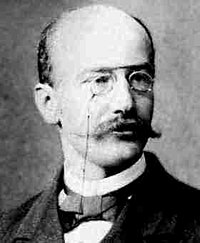Ferdinand von Lindemann
| Ferdinand von Lindemann | |
|---|---|

Carl Louis Ferdinand von Lindemann
|
|
| Born |
April 12, 1852 Hannover, German Confederation |
| Died | March 6, 1939 (aged 86) Munich, Germany |
| Residence | Germany |
| Nationality | German |
| Fields | Mathematician |
| Institutions | Ludwig-Maximilians-Universität München |
| Alma mater | Friedrich-Alexander-Universität Erlangen-Nürnberg |
| Doctoral advisor | C. Felix Klein |
| Doctoral students | Charles Hamilton Ashton Franz Fuchs Emil Hilb David Hilbert Martin Kutta Alfred Loewy Hermann Minkowski Oskar Perron Arthur Rosenthal Arnold Sommerfeld Josef Wagner |
| Known for | Proving π is a transcendental number |
Carl Louis Ferdinand von Lindemann (April 12, 1852 – March 6, 1939) was a German mathematician, noted for his proof, published in 1882, that π (pi) is a transcendental number, meaning it is not a root of any polynomial with rational coefficients.
Lindemann was born in Hanover, the capital of the Kingdom of Hanover. His father, Ferdinand Lindemann, taught modern languages at a Gymnasium in Hanover. His mother, Emilie Crusius, was the daughter of the Gymnasium's headmaster. The family later moved to Schwerin, where young Ferdinand attended school.
He studied mathematics at Göttingen, Erlangen, and Munich. At Erlangen he received a doctorate, supervised by Felix Klein, on non-Euclidean geometry. Lindemann subsequently taught in Würzburg and at the University of Freiburg. During his time in Freiburg, Lindemann devised his proof that π is a transcendental number (see Lindemann–Weierstrass theorem). After his time in Freiburg, Lindemann transferred to the University of Königsberg. While a professor in Königsberg, Lindemann acted as supervisor for the doctoral theses of the mathematicians David Hilbert, Hermann Minkowski, and Arnold Sommerfeld.
...
Wikipedia
